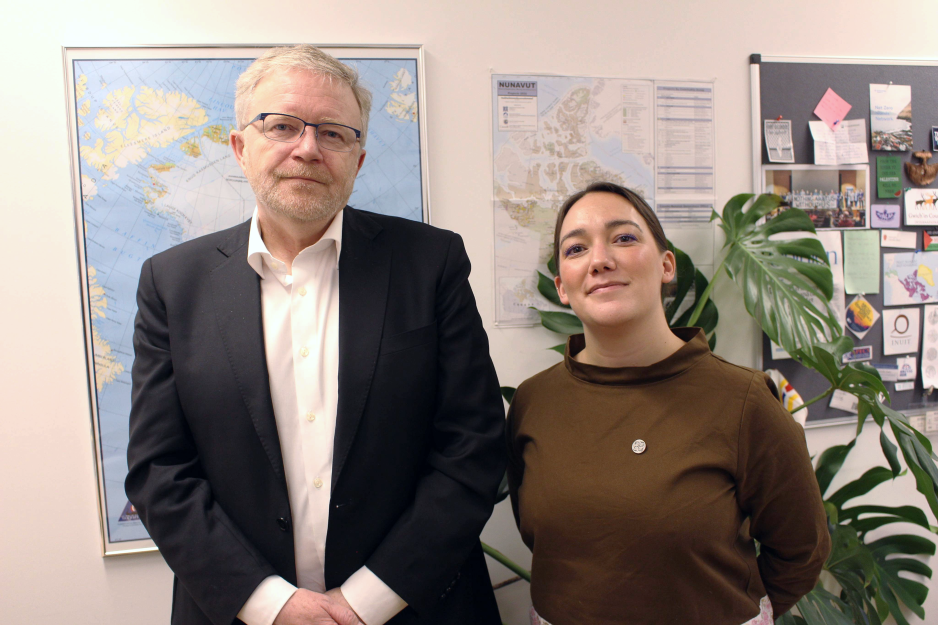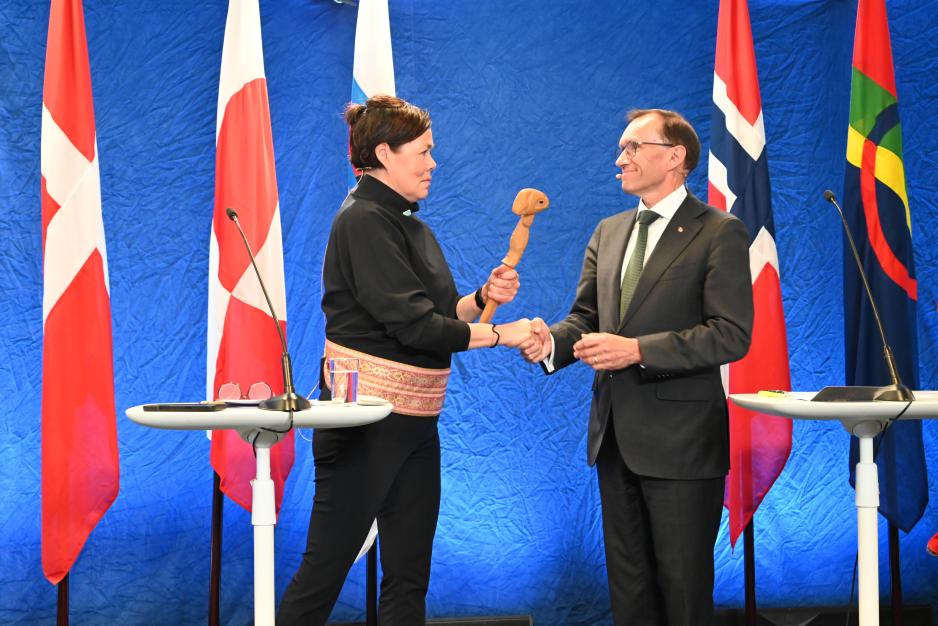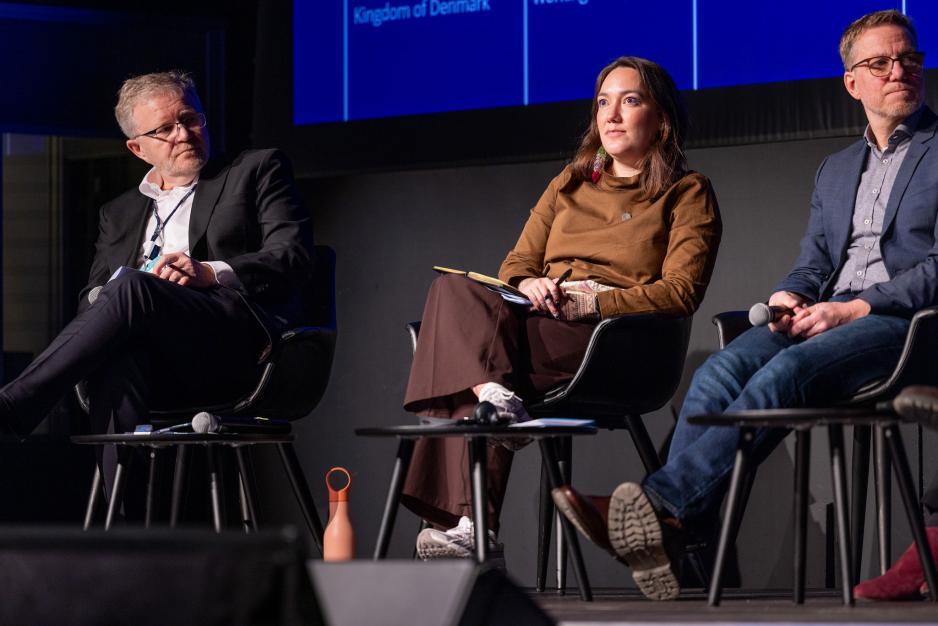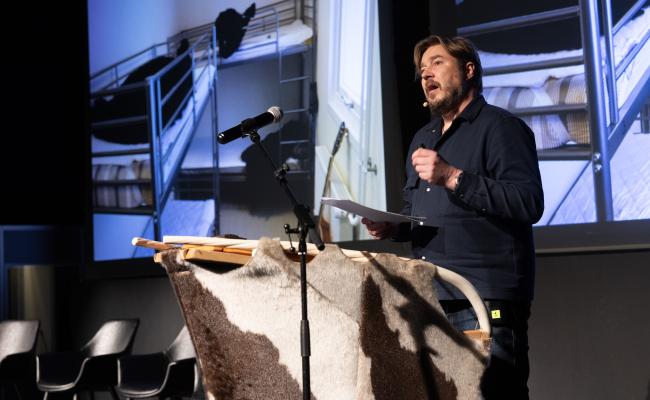Greenland Science Week: The Kingdom of Denmark's Chairship of the Arctic Council: "Unifying"

High North News met with the Chair of the Arctic Council's Senior Arctic Officials, Kenneth Høegh, and the Chair of the Council's Sustainable Development Working Group, Camilla Olsen, in Greenland to discuss the Kingdom of Denmark's chairship to the Arctic Council. (Photo: Birgitte Annie Hansen)
Nuuk, Grønland (High North News): In May, the Kingdom of Denmark took over the chairship of the Arctic Council, spearheaded by Greenland. “Greenland’s leading role in the council has been a unifying force within the kingdom,” says Kenneth Høegh, Chair of the Senior Arctic Officials, to High North News.
In May, the Kingdom of Denmark assumed chairship of the Arctic Council after Norway. The Norwegian chairship in the wake of Russia's invasion of Ukraine was depicted as a 'diplomatic work of art,' allowing the Kingdom of Denmark to take over a still functioning council.
Now, the Kingdom wants to continue building on Norway's good work.
"The chairship in the glue of the Arctic Council. We learned that from Norway," says Kenneth Høegh, the new Chair of the Senior Arctic Officials, to High North News.
We met Høegh during Greenland Science Week, a week focusing on research across Kalaalit Nunaat/Greenland, organized every other year. The week was concluded in Nuuk with the Greenland Science Conference and Qaagitsi, a science fair open to everyone who wants to know more about the research that is taking place on the island.
We also met Camilla Olsen, chair of the Council's Sustainable Development Working Group.
The Arctic Council
· The Arctic Council is an intergovernmental forum for cooperation between the region's eight countries, indigenous peoples, and other inhabitants on joint Arctic matters, particularly regarding sustainable development and environmental protection.
· The member states are Canada, Denmark, Finland, Iceland, Norway, Russia, Sweden and the US.
· Six Indigenous organizations are permanent participants of the Arctic Council. They have full consultation rights in connection with the council’s negotiations and decisions – as well as the opportunity to participate in all its meetings and activities.
· 13 non-Arctic states and several international and non-governmental organizations have observer status.
· The Arctic Council's main work takes place in six working groups and one expert group, under which many projects are organized. At this level, which primarily includes researchers and professionals, the cooperation between all eight Arctic countries continues. Council meetings at the diplomatic and political levels are still paused.
Circumstances beyond the council's control
The past few years have been challenging, but that is due to circumstances beyond the council's control, says Høegh.
After Russia's invasion of Ukraine, all council work was paused by the seven other Arctic states until Norway assumed chairship. After that, all contact took place in written form, until last year, when the council decided on a digital restart of the working groups.
"Of course, we want to get back to where we were, but we can't in this current situation. That is determined by circumstances beyond our control. However, we are trying as best we can to get as good communication between us as possible," says Høegh about the current situation in the council.
He adds that the chairship is continuously assessing what is possible and what can be done.
"For example, we have met the Senior Arctic Officials in groups, the Nordic officials separately, and the Americans and Canadians separately. Meeting in groups creates a completely different dynamic," he says, adding:
"But we meet Russia alone; that is how it must be right now."

"It is particularly fitting that it is Greenland that will hold the chairship gavel on behalf of the Kingdom of Denmark, as it is the actual Arctic part of the kingdom," said Norway's Minister of Foreign Affairs Espen Barth Eide at the ceremony. (Photo: the Arctic Council)
Digital dialogue
How has the digital cooperation been for you, Camilla Olsen?
"It has helped a lot in terms of getting the dialogue up and running. It has been very positive to go from a written procedure to being able to talk to each other in digital rooms. It has undoubtedly led to us getting projects and idea developments started," replies Olsen.
But she also sees challenges in working this way.
"There is a more natural cooperation when one has met in real life. And that is noticeable in the working groups at the moment. There is a lack of personal relations and personal contact with each other," she explains, and adds:
"There is an evident frustration, but also a great understanding of why it is not possible to meet right now. We are all willing to compromise in some areas to make the work run more smoothly."
A unifying force
Before the Kingdom of Denmark took over the chairship of the council, Greenland demanded a central role, as it is the reason why the Kingdom is considered an Arctic state.
Last year, it was revealed that Denmark, Greenland, and the Faroe Islands had agreed that Greenland would appoint a Greenlander for the role of the Kingdom's new Arctic ambassador and chair of the Arctic Council at the official level. This role was awarded to the Greenlandic Kenneth Høegh.
How does Greenland feel about its current role in the Arctic Council?
"The fact that Greenland has been given a leading role in the council has served as a unifying force within the Kingdom," replies Høegh, with Olsen nodding appreciative.
He says it was a great step forward for the Kingdom to acknowledge that Greenland is naturally the one with the most knowledge about the Arctic.
"We are part of the Kingdom's united efforts in the Arctic Council. We have a close cooperation with our Danish and Faroese colleagues," adds Høegh, and says that he has two offices, one in Nuuk and one in Copenhagen, between which he travels.

Both Høegh and Olsen participated in a panel discussion about the Kingdom of Denmark's chairship of the Arctic Council during the Greenland Science Conference this week. (Photo: Arctic Hub)
People-to-people and North-to-North
Two of the Kingdom's priorities in the chairship of the Arctic Council are Indigenous Peoples and people in the Arctic. Do you think moving away from state-centric topics and toward people-to-people cooperation can be part of ensuring the council's survival?
"I think that is an expression of the fact that we actually live in the Arctic. All Kalaalit live in the Arctic. I think that is one of the reasons for the political demand that the human dimension and the indigenous dimension should play a major role," says Høegh.
Camilla Olsen adds that it is about looking back and considering who the Arctic Council is actually for.
"For us, it goes without saying that it should be about us because we are the ones who are here," she says and continues:
"From Greenland's side, there has been a great focus on not forgetting the north-to-north cooperation among all Arctic peoples. It is important to strengthen that cooperation rather than capital-to-north cooperation."
Greenland having a leading role in the council has had a unifying force within the Kingdom.
Agreement/disagreement on climate
Climate is one of the council's most important focus areas. What is it like to cooperate with the USA, where the country's president has conducted a significant attack on climate research, and who continues to call man-made climate change a hoax?
"There have always been areas on which we cannot agree, but we have also found ways to reach consensus. If you look at the Romssa-Tromsø Statement, the word 'warming' is used, so we have agreed that there is a warming taking place," replies Høegh.
He is referring to the statement released after taking over the chairship in May this year. There was uncertainty as to whether or not the member countries would even agree on a statement. The statement said nothing about climate change being man-made, but that was not part of the negotiations, says Høegh.
"I still think it is positive that one can still discuss the effects and consequences that the warming has on the Arctic."
"We try to find common ground in the Arctic Council, and I think we will succeed. I don't think we should focus too much on what we don't agree on, but rather talk about what we do agree on," says Høegh, adding that he believes the consensus principle is one of the reasons why the Arctic has survived for nearly 30 years.
Indigenous knowledge should be respected, and not only that, it should be utilized as part of the overall research.
Indigenous knowledge is not mystical
Throughout the Greenland Science Week, focus has been on the integration of Indigenous knowledge in everything from science to policy-making. This is also a focus of the Arctic Council.
Vivian Motzfeldt stated during the transfer of chairship from Norway to the Kingdom of Denmark that Indigenous knowledge will be prioritized on equal footing with Western science in all aspects of the council's work. How will you do that?
"We do that by continuously shedding light on it," answers Høegh.
"I think it's important for people to be told about Indigenous knowledge and for people to understand that it is useful. Some might think it sounds mystical, but it is not. It is common sense, inherent in the Indigenous Peoples that have lived here for thousands of years," he explains and continues:
"It is about knowing how the wind works in the fjords, where the whales and hares are located and when, for example. People have not necessarily created evidence for these observations, but they are often correct anyway."
"That knowledge should be respected, and not only that, it should be utilized as part of the overall research. Combining Western research and indigenous knowledge means that you get a much better end product."
Upcoming activities
What can you say about upcoming activities during the Kingdom's chairship?
"The Ocean Connectivity Conference will take place in Tórshavn, the Faroe Islands, in May 2026 in connection with the UArctic Congress," says Høegh.
A workshop will also be held in Greenland next year, focusing on sustainable economic development. In addition, the chairship has plans for a conference on biodiversity in 2027.
"The Arctic Council's Chairship Youth Committee will also organize a conference at the beginning of 2027, for which they are solely responsible. Our job is to guide and facilitate, but they will make all the decisions," adds Olsen and continues:
The Youth Committee is elected by the current chairship, as well as Sweden and Canada, who will be chairs in 2027-2029 and 2029-2031, respectively. The Kingdom has appointed three representatives, while Sweden and Canada have elected one each."
In addition, organisations that the council cooperates with, such as UArctic, the Inuit Circumpolar Council, the Permanent Participants Youth Network, and the Sami Council, have appointed representatives. The committee consists of a total of 10 young people between 20 and 30 years old.
The Youth Committee was established during the Norwegian chairship, and the Kingdom of Denmark wants to continue to strengthen young people's role in the Arctic Council, concludes Høegh.


